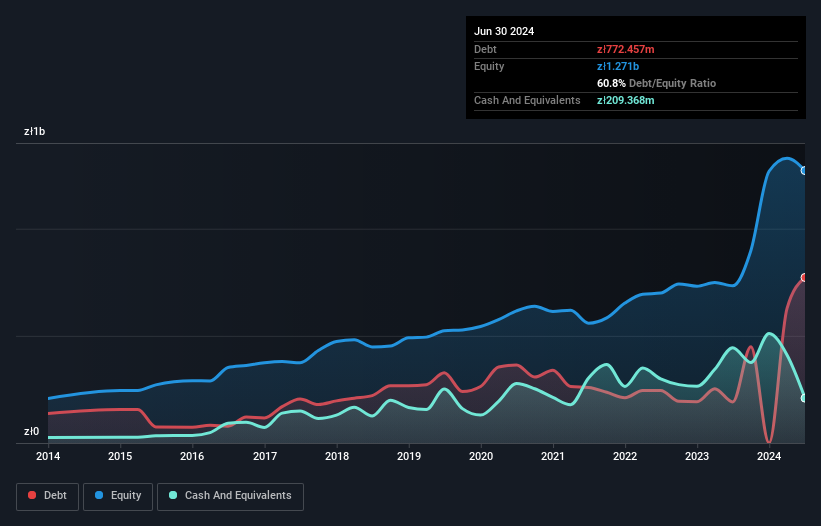The external fund manager backed by Berkshire Hathaway's Charlie Munger, Li Lu, makes no bones about it when he says 'The biggest investment risk is not the volatility of prices, but whether you will suffer a permanent loss of capital.' So it might be obvious that you need to consider debt, when you think about how risky any given stock is, because too much debt can sink a company. We note that Archicom S.A. (WSE:ARH) does have debt on its balance sheet. But the more important question is: how much risk is that debt creating?
What Risk Does Debt Bring?
Generally speaking, debt only becomes a real problem when a company can't easily pay it off, either by raising capital or with its own cash flow. In the worst case scenario, a company can go bankrupt if it cannot pay its creditors. However, a more usual (but still expensive) situation is where a company must dilute shareholders at a cheap share price simply to get debt under control. Of course, plenty of companies use debt to fund growth, without any negative consequences. The first thing to do when considering how much debt a business uses is to look at its cash and debt together.
View our latest analysis for Archicom
How Much Debt Does Archicom Carry?
You can click the graphic below for the historical numbers, but it shows that as of June 2024 Archicom had zł772.5m of debt, an increase on zł191.7m, over one year. However, it does have zł209.4m in cash offsetting this, leading to net debt of about zł563.1m.

How Strong Is Archicom's Balance Sheet?
We can see from the most recent balance sheet that Archicom had liabilities of zł803.0m falling due within a year, and liabilities of zł727.0m due beyond that. Offsetting this, it had zł209.4m in cash and zł209.4m in receivables that were due within 12 months. So its liabilities total zł1.11b more than the combination of its cash and short-term receivables.
While this might seem like a lot, it is not so bad since Archicom has a market capitalization of zł1.92b, and so it could probably strengthen its balance sheet by raising capital if it needed to. But we definitely want to keep our eyes open to indications that its debt is bringing too much risk.
We measure a company's debt load relative to its earnings power by looking at its net debt divided by its earnings before interest, tax, depreciation, and amortization (EBITDA) and by calculating how easily its earnings before interest and tax (EBIT) cover its interest expense (interest cover). Thus we consider debt relative to earnings both with and without depreciation and amortization expenses.
We'd say that Archicom's moderate net debt to EBITDA ratio ( being 1.9), indicates prudence when it comes to debt. And its strong interest cover of 135 times, makes us even more comfortable. Pleasingly, Archicom is growing its EBIT faster than former Australian PM Bob Hawke downs a yard glass, boasting a 119% gain in the last twelve months. When analysing debt levels, the balance sheet is the obvious place to start. But it is future earnings, more than anything, that will determine Archicom's ability to maintain a healthy balance sheet going forward. So if you want to see what the professionals think, you might find this free report on analyst profit forecasts to be interesting.
Finally, a business needs free cash flow to pay off debt; accounting profits just don't cut it. So the logical step is to look at the proportion of that EBIT that is matched by actual free cash flow. In the last three years, Archicom basically broke even on a free cash flow basis. Some might say that's a concern, when it comes considering how easily it would be for it to down debt.
Our View
Archicom's interest cover was a real positive on this analysis, as was its EBIT growth rate. But truth be told its conversion of EBIT to free cash flow had us nibbling our nails. Looking at all this data makes us feel a little cautious about Archicom's debt levels. While debt does have its upside in higher potential returns, we think shareholders should definitely consider how debt levels might make the stock more risky. There's no doubt that we learn most about debt from the balance sheet. But ultimately, every company can contain risks that exist outside of the balance sheet. Case in point: We've spotted 4 warning signs for Archicom you should be aware of, and 2 of them are significant.
Of course, if you're the type of investor who prefers buying stocks without the burden of debt, then don't hesitate to discover our exclusive list of net cash growth stocks, today.
New: Manage All Your Stock Portfolios in One Place
We've created the ultimate portfolio companion for stock investors, and it's free.
• Connect an unlimited number of Portfolios and see your total in one currency
• Be alerted to new Warning Signs or Risks via email or mobile
• Track the Fair Value of your stocks
Have feedback on this article? Concerned about the content? Get in touch with us directly. Alternatively, email editorial-team (at) simplywallst.com.
This article by Simply Wall St is general in nature. We provide commentary based on historical data and analyst forecasts only using an unbiased methodology and our articles are not intended to be financial advice. It does not constitute a recommendation to buy or sell any stock, and does not take account of your objectives, or your financial situation. We aim to bring you long-term focused analysis driven by fundamental data. Note that our analysis may not factor in the latest price-sensitive company announcements or qualitative material. Simply Wall St has no position in any stocks mentioned.
About WSE:ARH
Exceptional growth potential with adequate balance sheet.
Market Insights
Community Narratives




